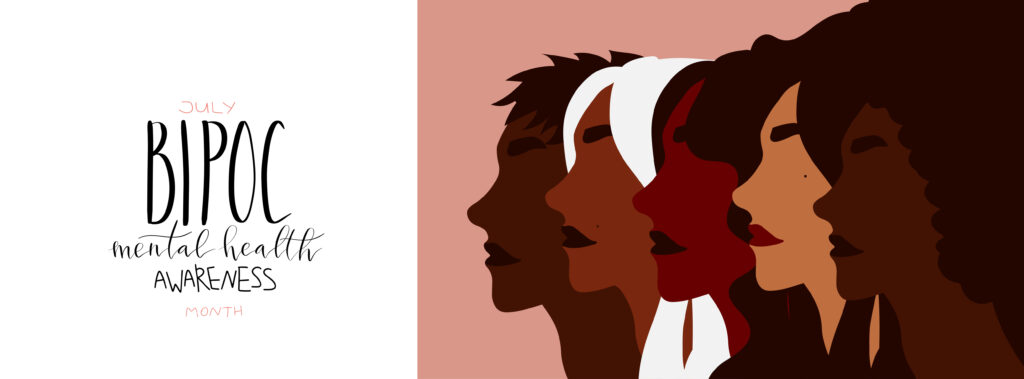
5 Things to Know About BIPOC Mental Health Month
July is BIPOC Mental Health Month. While we are making strides as a country in trying to reduce the stigma associated with mental health, we still have a long way to go.
Members that fall within the Black, Indigenous, and People of Color communities have stress and trauma that are directly related to their socioeconomic situations and disparities that aren’t present for the population as a whole. Discrimination, systemic inequities, and more not only lead to this overload but can play a significant role in mental health.
What’s more, access to mental health services, as well as the willingness to seek them, are not there.
Although it should be addressed every day of the year, we couldn’t let the month of July slip by without acknowledging the significance of BIPOC Mental Health Month. Here are 5 things you should know.
1. The Number of BIPOC Individuals Dealing with Mental Health Issues is Substantial
By taking a look at BIPOC mental health statistics, it is easy to see that there is a need in each community. Why? Because the prevalence of mental illness is staggering.
Below are a few of the major statistics that will help to paint a picture of these communities and their need for services. The prevalence of mental illness in specific demographics:
-
21.4% of Non-Hispanic Black or African Americans
-
20.7% of Latinx/Hispanic Americans
-
16.4% of Asian Americans
-
26.6% of Native Americans/Alaskan Natives
-
18.% of Native Hawaiian or Other Pacific Islander
-
34.9% of those who identify as multi-racial
Keep in mind that these statistics are always changing—and they do not account for those who have not sought help. In other words, the real numbers are likely much higher.
2. There are Barriers to Receiving Proper Mental Health Care
White people tend to seek treatment for mental illness at a much higher rate than those who fall into one of the BIPOC demographics. When it comes to receiving treatment, again, let the statistics speak. Below are percentages of those who reach out for help.
-
25.4% Non-Hispanic Asian
-
36.1% Hispanic or Latino
-
39.4% Non-Hispanic Black or African American
-
52.2% of Non-Hispanic Multiracial
Why does this happen? Likely due to the barriers to receiving proper mental health care for these communities, such as:
-
Lack of insurance or being under-insured
-
Language barriers
-
Poor diversity among mental health providers
-
Lack of trust in the healthcare system
Finally, it should be highly noted that the mental health stigma is still very strong in many of these populations, making those within them less likely to seek the help they need.
Thanks to BIPOC Mental Health Month, more awareness is being brought to these issues so that a steady forward progression of change can be made.
3. Not All BIPOC Individuals Have Access to Care
In order to seek treatment for mental health issues, one must have the ability to access care. And, when it comes to BIPOC communities, this is not always the situation.
Many of these individuals are faced with not having adequate healthcare coverage, assuming they have any at all. Because not all health insurance companies provide access to thorough mental health treatment, this can be even more limiting.
The cost of treatment out-of-pocket is exorbitant. Since a percentage of those in BIPOC communities tend to be of lower income, this can lead to great difficulties in reaching the services they need.
4. Racial Discrimination Overlooks Mental Illness
Whether we want to admit it or not, racial discrimination plays a role in how professionals see mental illness. All too often mental health conditions are overlooked within minority communities.
Referred to as provider discrimination, studies show, for instance, that some mental health professionals are more likely to identify mental health conditions in white clients than in non-white clients.
While there may be many reasons that this happens, a lot of it can come down to ignorance—making the assumption that the prevalence isn’t there due to a lack of understanding and knowledge.
This is why it is so important that BIPOC Mental Health Month as well as other initiatives make the push to a greater understanding.
5. Cultural Insensitivities Found Among Mental Health Providers
Imagine getting the nerve to ask for help. You make an appointment and show up at the scheduled time—only to realize that the provider you are seeing doesn’t understand you.
Unfortunately, many minorities find it difficult to gain easy access to mental health providers who fully understand their needs or a member of the same BIPOC community themselves. Without this, seeking treatment for mental health issues can be discouraging and can void all future attempts at doing so.
Mental Illness Does Not Discriminate
Despite what takes place in our society, mental illness does not discriminate. It can cross ethnic lines, socioeconomic lines, educational lines, and so forth. No matter who you are or where you come from, you may encounter mental illness.
And finding high-quality mental health providers that are able to meet your need should not be an issue.
Except, for many, it is.
As we celebrate BIPOC Mental Health Month and bring awareness to these issues, we are taking a step in the right direction. Though, the positive change cannot happen fast enough.
If you are a minority suffering from a mental illness, finding the right mental health professional is crucial.
Mental Health Treatment for All Communities at Amend Treatment
Everyone should have access to high-quality mental health treatment — and that includes those in all communities. As BIPOC Mental Health Month brings mental illness issues to light, it is important to know that help is available.
At Amend Treatment, we offer our services to those of all backgrounds. We strive to bring balance and healing to those struggling with a variety of mental health conditions, including depression, anxiety, PTSD, bipolar disorder, obsessive-compulsive disorder, eating disorders, ADHD, and more.
We step outside the box and meet you right where you are with lots of different modalities to enhance the effectiveness of your treatment. To learn more about our treatment options or our skilled mental health professionals, contact us today.
